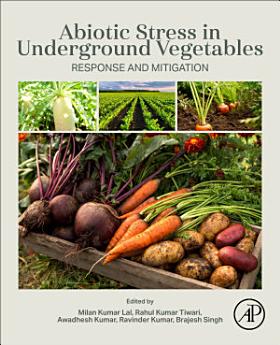Abiotic Stress in Underground Vegetables: Response and Mitigation
About this ebook
About the author
Dr. Milan Kumar Lal, Doctor in Plant Physiology, working in the area of abiotic, abiotic stress and nutritional aspect of potato and other starchy crops at ICAR-Central Potato Research Institute, Shimla, India. He is an expert worker in the area of abiotic stress such as heat, drought salinity and heavy metal. Moreover, he is also working on the aspect of the effect of biotic stress such as fungus, virus and bacteria on plant physiological, biochemical and molecular responses. Apart from this, he also has expertise in the nutritional and quality aspects of starchy crops, including resistant starch, glycemic index, phytonutrients, functional fermented foods and beverages, bioactive compounds, and various processing techniques to enhance these components in food products of starchy crops. His findings have generated more than 90 publications in the international peer-reviewed journal.
Dr Rahul Kumar Tiwari, a doctor in Plant Pathology, works as a scientist at Central Potato Research Institute Shimla, India. He is currently working on melatonin-mediated mitigation of soil and tuber-borne diseases and physiological disorders in crop plants. He has also worked on signalling mechanism of pathogens, pathogenomics and management of hemibiotrophic fungi. He has explored the genetic diversity of pathogenic microbes in field and horticultural crops. Additionally, his area of interest is on multiple aspects of pathophysiological alterations in food crops under the influence of diverse biotic and abiotic stresses. He has published more than 40 publications in national and internationally reputed journal.
Dr. Awadhesh Kumar, Ph.D., Scientist (Plant Biochemistry), ICAR-National Rice Research Institute, Cuttack, Odisha, India has over 17 years research experience on nutritional and molecular biochemistry. Presently, he is working on starch digestibility parameters (Glycemic index, amylose, resistant starch) and role of antinutritional factor (phytic acid) on minerals bioavailability in rice grain. He is also working on the improvement of photosynthetic efficiency in rice. In addition to above research areas, he is also involved in exploring the role of abiotic stresses (drought, heat and low light) on biochemical and nutritional parameters in rice. He has published more than 100 research/review/other articles in various national and international journals. In his credit, 3 patents are granted in the year between 2020-2022.
Dr. Ravinder Kumar, Ph.D., Senior Scientist (Plant Pathology), ICAR-Central Potato Research Institute, Shimla, Himachal Pradesh, India has over 15 years of research experience on biotic and abiotic stresses management in plant, potato biotechnology, particularly formulation of dsRNA for late blight, development of transgenic lines with ToLCNDV resistance, potato genetic resource management, developed several diagnostic tools like uniplex/multiplex RT-PCR, real-time RT-PCR, LAMP, and RT-RPA protocols for the detection of potato pathogens, molecular characterization and genome sequencing of plant pathogens. He has published over 120 research papers/reviews articles in national/international peer-reviewed journals, training manuals and book chapters, edited Institute publications like newsletters and annual reports. He is the recipient of Awards like IPA-Kaushalya Sikka Memorial Award, Chandra Prabha Singh Young Scientist Award, Young Scientist Associate award, best oral/poster awards of different scientific professional societies.
Dr. Brajesh Singh Doctor in Botany, Principal Scientist at ICAR-Central Potato Research Institute Shimla and Head of Crop Physiology, Biochemistry and Post-Harvest Technology Division. His interest had been on potato storage technologies and processing and nutritional quality assessments. He is currently coordinating the programme on Post harvest management and nutritional enhancement of potatoes. He has authored more than 100 peer-reviewed articles and is author of four patents.






